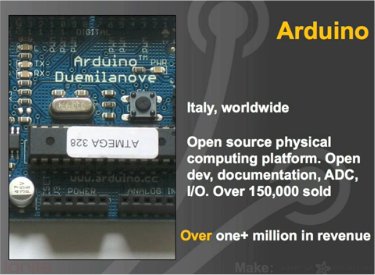Selling products whose design anyone can access, edit, or use on their own is pretty crazy. It’s also good business according to 13 Open Source Hardware Companies Making $1 Million or More (video) article. The article mentions thirteen companies with million dollar revenues from open source hardware (OSHW).Companies providing OSHW allow all designs of the products to be shared through an open license, meaning that everyone is free to download, modify, and share all the schematics and associated software. You’re encouraged to make, refine, or even sell your own versions of these products. If you are used to the business models of companies that take use of patent and copyright loving system, this business model might seem to strange. But it has proven to work just like open source software. Just five years ago, there were only a handful of OSHW projects actively supported. Now there are more than 200. It is estimated that the OSHW industry will reach a billion dollars by 2015. The article includes a presentation video and a slide set.

Image source: video on the article
I saw this article first mentioned at at 13 Open Source Hardware Companies Make $1+ Million post at Slashdot.
8 Comments
Andrew A. Sailer says:
Thanks.
Twitter Bot says:
Holy Crap! Mass-Follow.com is Sweet!
Abby Krukowski says:
OMg! Man, It took me hours to find this information. So glad that I stumbled upon your site.
Tomi Engdahl says:
Vote engineer Limor ‘Ladyada’ Fried in as entrepreneur of the year
http://www.edn.com/electronics-blogs/other/4392145/Vote-engineer-Limor–Ladyada–Fried-in-as-entrepreneur-of-the-year?cid=EDNToday
The good folks at Adafruit have shared some exciting news. Their own Limor “Ladyada” Fried is up for the prestigious “Entrepreneur of the Year” title awarded by Entrepreneur Magazine.
If you are not familiar with open-source hardware and software company Adafruit, it was founded by Limor about seven years ago and is on a mission to educate and inspire the next generation of scientists and engineers. It has grown to 25 employees and $4.5 million in 2011 revenue, placing Limor in Entrepreneur Magazine’s “established entrepreneur” category.
Who owns our modern stuff? « Tomi Engdahl’s ePanorama blog says:
[...] there are nowadays some exceptions to this rule, for example open source hardware companies. Open doesn’t conflict with money although it often appears [...]
Tomi Engdahl says:
Send in the clones
Massimo Banzi — July 10th, 2013
http://blog.arduino.cc/2013/07/10/send-in-the-clones/
When we came up with Arduino, one of the things we decided very early on was that we wanted to release the hardware design files so that people could make their own versions or just make an exact copy if they couldn’t find boards where they lived.
I think we contributed to popularize the concept of open source hardware and we can see it from the huge amount of variations of Arduino-compatible devices being released every day.
After the platform started to become popular we had the issue of figuring out a business model to sustain our work and keep innovating the project.
Plants says:
Please let me know if you’re looking for a author for your blog.
You have some really great posts and I think
I would be a good asset. If you ever want to take some
of the load off, I’d really like to write some content for your blog in exchange for a link back to mine.
Please send me an email if interested. Kudos!
Tomi Engdahl says:
Open Source Hardware Certification Announced
http://hackaday.com/2015/09/21/open-source-hardware-certification-announced/
Last weekend was the Open Hardware Summit in Philadelphia, and the attendees were nearly entirely people who build Open Source Hardware. The definition of Open Source Hardware has been around for a while, but without a certification process, the Open Hardware movement has lacked the social proof required of such a movement; there is no official process to go through that will certify hardware as open hardware, and there technically isn’t a logo you can slap on a silkscreen layer that says your project is open hardware.
Now, the time has come for an Open Hardware Certification. At OHSummit this weekend, the Open Source Hardware Association (OSHWA) announced the creation of a certification process for Open Source Hardware.
Open Hardware is well defined, but as with any kind of license, there are questions about what happens when things that aren’t open hardware are integrated into a project. The largest problem facing any Open Hardware project is the parts outside of the creator’s control.
Open Source Hardware Certification Version 1
http://www.oshwa.org/2015/09/19/open-source-hardware-certification-version-1/
This is version 1 of an official certification for open source hardware housed in the Open Source Hardware Association. It outlines the purpose and goals of such a certification, and establishes the mechanisms for the operation of the certification process itself.
Primary Goals
Make it easier for the public to identify open source hardware.
Expand the reach of open hardware by making it easier for newer members to join the open source hardware community.